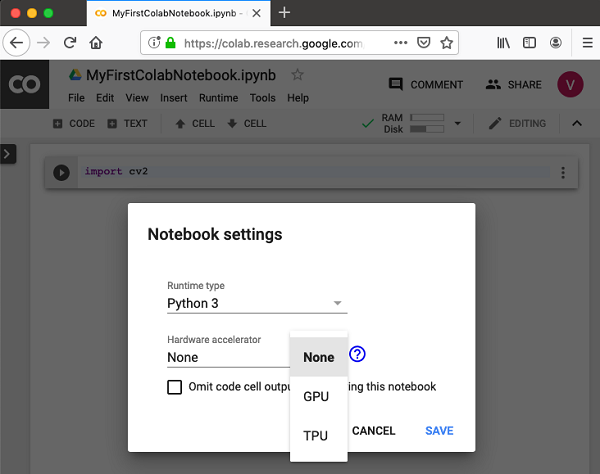
- Google Colab - Home
- Google Colab - Introduction
- What is Google Colab?
- Your First Colab Notebook
- Documenting Your Code
- Google Colab - Saving Your Work
- Google Colab - Sharing Notebook
- Invoking System Commands
- Executing External Python Files
- Google Colab - Graphical Outputs
- Google Colab - Code Editing Help
- Google Colab - Magics
- Google Colab - Adding Forms
- Google Colab - Installing ML Libraries
- Google Colab - Using Free GPU
- Google Colab - Conclusion
- Google Colab Useful Resources
- Google Colab - Quick Guide
- Google Colab - Useful Resources
- Google Colab - Discussion
Google Colab - Using Free GPU
Google provides the use of free GPU for your Colab notebooks.
Enabling GPU
To enable GPU in your notebook, select the following menu options −
Runtime / Change runtime type
You will see the following screen as the output −

Select GPU and your notebook would use the free GPU provided in the cloud during processing. To get the feel of GPU processing, try running the sample application from MNIST tutorial that you cloned earlier.
!python3 "/content/drive/My Drive/app/mnist_cnn.py"
Try running the same Python file without the GPU enabled. Did you notice the difference in speed of execution?
Testing for GPU
You can easily check if the GPU is enabled by executing the following code −
import tensorflow as tf tf.test.gpu_device_name()
If the GPU is enabled, it will give the following output −
'/device:GPU:0'
Listing Devices
If you are curious to know the devices used during the execution of your notebook in the cloud, try the following code −
from tensorflow.python.client import device_lib device_lib.list_local_devices()
You will see the output as follows −
[name: "/device:CPU:0"
device_type: "CPU"
memory_limit: 268435456
locality { }
incarnation: 1734904979049303143, name: "/device:XLA_CPU:0"
device_type: "XLA_CPU" memory_limit: 17179869184
locality { }
incarnation: 16069148927281628039
physical_device_desc: "device: XLA_CPU device", name: "/device:XLA_GPU:0"
device_type: "XLA_GPU"
memory_limit: 17179869184
locality { }
incarnation: 16623465188569787091
physical_device_desc: "device: XLA_GPU device", name: "/device:GPU:0"
device_type: "GPU"
memory_limit: 14062547764
locality {
bus_id: 1
links { }
}
incarnation: 6674128802944374158
physical_device_desc: "device: 0, name: Tesla T4, pci bus id: 0000:00:04.0, compute capability: 7.5"]
Checking RAM
To see the memory resources available for your process, type the following command −
!cat /proc/meminfo
You will see the following output −
MemTotal: 13335276 kB MemFree: 7322964 kB MemAvailable: 10519168 kB Buffers: 95732 kB Cached: 2787632 kB SwapCached: 0 kB Active: 2433984 kB Inactive: 3060124 kB Active(anon): 2101704 kB Inactive(anon): 22880 kB Active(file): 332280 kB Inactive(file): 3037244 kB Unevictable: 0 kB Mlocked: 0 kB SwapTotal: 0 kB SwapFree: 0 kB Dirty: 412 kB Writeback: 0 kB AnonPages: 2610780 kB Mapped: 838200 kB Shmem: 23436 kB Slab: 183240 kB SReclaimable: 135324 kB SUnreclaim: 47916 kBKernelStack: 4992 kB PageTables: 13600 kB NFS_Unstable: 0 kB Bounce: 0 kB WritebackTmp: 0 kB CommitLimit: 6667636 kB Committed_AS: 4801380 kB VmallocTotal: 34359738367 kB VmallocUsed: 0 kB VmallocChunk: 0 kB AnonHugePages: 0 kB ShmemHugePages: 0 kB ShmemPmdMapped: 0 kB HugePages_Total: 0 HugePages_Free: 0 HugePages_Rsvd: 0 HugePages_Surp: 0 Hugepagesize: 2048 kB DirectMap4k: 303092 kB DirectMap2M: 5988352 kB DirectMap1G: 9437184 kB
You are now all set for the development of machine learning models in Python using Google Colab.